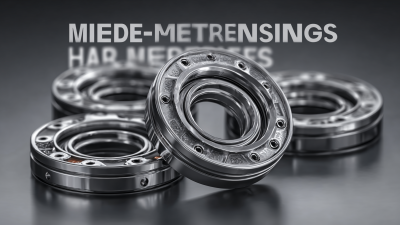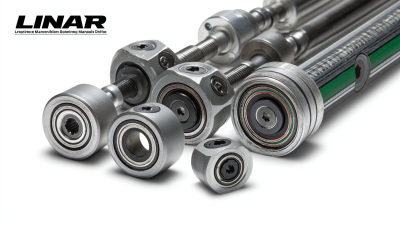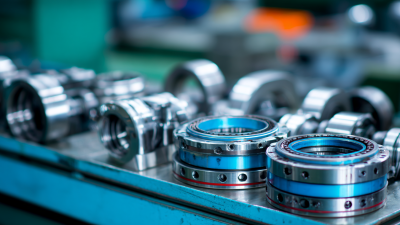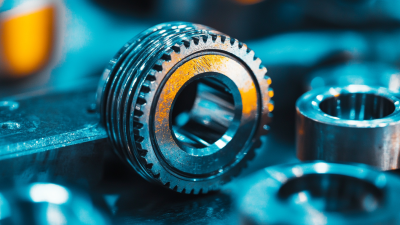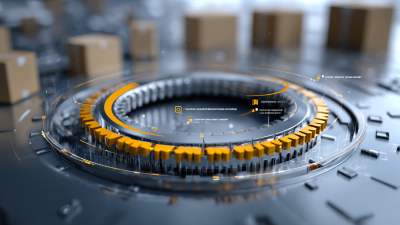Exploring the Best Options: A Comprehensive Comparison of High-Speed Bearings Custom Services
In the fast-paced world of manufacturing and engineering, the demand for efficient and reliable components is crucial, particularly when it comes to high-speed applications. According to a recent industry analysis by MarketsandMarkets, the global high-speed bearings market is projected to reach USD 12.3 billion by 2025, driven by advancements in technology and increasing automation across various sectors.
As machinery and equipment strive for greater performance, the importance of High-Speed Bearings Custom Service becomes evident. These custom solutions not only enhance operational efficiency but also prolong the lifespan of critical components. This blog aims to delve into a comprehensive comparison of available custom services for high-speed bearings, exploring the key options that can help businesses optimize their operations while adhering to specific performance requirements and industry standards.
Emerging Trends in High-Speed Bearing Technologies and Custom Services
As industries pivot towards more efficient and faster operations, high-speed bearing technologies are witnessing significant advancements. According to a report by MarketsandMarkets, the high-speed bearing market is expected to grow from USD 4.12 billion in 2021 to USD 6.35 billion by 2026, representing a CAGR of 9.3%. This surge is largely driven by the increasing demand for improved machinery performance, precision engineering, and the adoption of automation across sectors such as automotive, aerospace, and renewable energy.

Emerging trends in this arena include the development of advanced materials and coatings that enhance durability and reduce friction. For instance, ceramic bearings are becoming popular due to their lightweight nature and resistance to wear, providing an optimal solution for high-speed applications. Additionally, specialized custom services tailored to individual industry needs allow for improved design flexibility and performance optimization, ensuring that businesses can meet specific operational challenges effectively.
Tips: When selecting high-speed bearings, consider their material and lubricating options, as these factors significantly impact their longevity and efficiency. Moreover, investing in custom services can prove beneficial; engaging with manufacturers early in the design process can lead to tailored solutions that enhance machine performance and reduce downtime. Always keep an eye on industry reports for the latest advancements to stay competitive.
Analyzing Performance Metrics: Speed, Durability, and Precision in Bearings
In the fast-paced world of machinery and automotive applications, high-speed bearings play a crucial role in enhancing performance efficiency. When evaluating custom bearing services, three key performance metrics stand out: speed, durability, and precision. Speed is paramount; high-speed bearings must minimize friction to operate seamlessly at elevated rpm levels, ensuring that equipment runs smoothly and effectively. This attribute significantly impacts overall machine performance, contributing to reduced energy consumption and extended operational longevity.
Durability is another essential factor, as bearings are subjected to intense conditions that can lead to wear and tear. Custom service providers must offer bearings capable of withstanding extreme forces, temperatures, and environmental challenges. Advanced materials and specialized coatings can enhance the lifespan of these critical components, reducing the need for frequent replacements and minimizing maintenance costs.
Finally, precision cannot be overlooked. High-speed bearings must maintain tight tolerances to ensure optimal alignment and functionality. Variations in precision can lead to catastrophic failures, impacting not only the machine's performance but also the safety of operations. Therefore, thorough testing and quality assurance processes are vital for custom bearing services. By focusing on these performance metrics, businesses can make informed decisions when selecting high-speed bearing solutions tailored to their specific operational needs.
Exploring the Best Options: A Comprehensive Comparison of High-Speed Bearings Custom Services
This chart provides a comparative analysis of five different high-speed bearing options based on three performance metrics: Speed (in RPM), Durability (in hours), and Precision (in micrometers). The data illustrates how each option stacks up against the others across these key criteria.
Cost-Benefit Analysis of Custom High-Speed Bearings: Is It Worth It?
When considering custom high-speed bearings, a cost-benefit analysis can be crucial in determining their overall value. According to a recent industry report by the Bearing Institute, custom bearings can increase efficiency by up to 30% compared to standard options, translating into significant cost savings over time. The initial investment might be higher, but evaluating performance gains, durability, and specific application advantages can justify the expense. For industries where precision and reliability are paramount, the long-term benefits often outweigh the costs.

Tips for making the right decision include assessing your operational requirements carefully. Custom bearings should be evaluated based on load, speed, and environmental factors, as these considerations can enhance performance. Additionally, don’t overlook maintenance costs—investing in high-quality, custom solutions may reduce the frequency and expense of replacements, ultimately resulting in a more cost-effective choice. Engaging with engineers or suppliers who specialize in tailored solutions can provide insights essential for making informed decisions.
Industry Applications: How High-Speed Bearings Boost Efficiency Across Sectors
High-speed bearings are essential components in modern industrial applications, playing a crucial role in enhancing efficiency across various sectors. From manufacturing to aerospace, these specialized bearings minimize friction and wear, enabling machinery to operate smoothly at increased speeds. In the automotive industry, for instance, high-speed bearings contribute to improved fuel efficiency and performance by allowing engines to run at optimal RPMs, reducing energy losses and extending the lifespan of critical components.
In the renewable energy sector, high-speed bearings are instrumental in wind turbines, where they support the rotor's rapid rotation while withstanding the harsh environmental conditions. Their durability and lightweight design contribute to more efficient energy conversion processes, ultimately leading to lower operational costs. Similarly, in the robotics and automation fields, high-speed bearings enhance accuracy and responsiveness, enabling machines to perform complex tasks with precision. By investing in high-performance custom bearing solutions, industries can significantly boost their productivity and maintain a competitive edge in today’s fast-paced market.
Exploring the Best Options: A Comprehensive Comparison of High-Speed Bearings Custom Services
| Application Sector |
Bearing Type |
Custom Features |
Max Speed (RPM) |
Load Capacity (kg) |
Temperature Range (°C) |
Efficiency Improvement (%) |
| Aerospace |
Angular Contact Ball Bearing |
High Temperature Coating |
50000 |
250 |
-55 to 300 |
15 |
| Automotive |
Deep Groove Ball Bearing |
Sealed Against Contaminants |
12000 |
200 |
-40 to 150 |
20 |
| Industrial Machinery |
Roller Bearing |
Lubrication Channels |
8000 |
300 |
-30 to 120 |
25 |
| Electronics |
Miniature Bearing |
Noise Reduction Technology |
30000 |
50 |
-20 to 60 |
10 |
| Wind Energy |
Spherical Roller Bearing |
Corrosion Resistance |
6000 |
400 |
-10 to 80 |
30 |
Evaluating Supplier Capabilities: Key Factors for Selecting Custom Bearing Services
 When evaluating supplier capabilities for custom high-speed bearings, several key factors come into play. Firstly, the technical expertise of the manufacturer is crucial. Look for suppliers who have a proven track record in engineering and producing high-speed bearings that meet specific performance criteria. They should also be able to demonstrate their knowledge of the materials used and the various design options available, ensuring that the bearings can withstand the demands of high-speed applications.
When evaluating supplier capabilities for custom high-speed bearings, several key factors come into play. Firstly, the technical expertise of the manufacturer is crucial. Look for suppliers who have a proven track record in engineering and producing high-speed bearings that meet specific performance criteria. They should also be able to demonstrate their knowledge of the materials used and the various design options available, ensuring that the bearings can withstand the demands of high-speed applications.
Another important aspect to consider is the flexibility and responsiveness of the supplier. Custom projects often come with unique specifications and tight deadlines, so it's essential to partner with a supplier that can adapt quickly to changing requirements. Strong communication channels and a collaborative approach to problem-solving can significantly enhance the development process. Additionally, assessing the supplier's quality control measures and certifications can provide assurance of their commitment to manufacturing excellence, further solidifying their capability as a reliable partner for custom bearing services.

Home
Products
Industrial Bearings
Deep Groove Ball Bearings
Self-Aligning Ball Bearings
Angular Contact Ball Bearings
Cylindrical Roller Bearings
Taper Roller Bearings
Spherical Roller Bearings
Bearing housing or Accessories
Miniature Bearing
Thrust ball bearing
Radial Spherical Plain Bearing
Pillow Block Bearing
Needle Roller Bearings
Automotive Bearings
Agricultural Bearings
Special Material Bearings
Industry Application
About Us
News
Contact Us






 When evaluating supplier capabilities for custom high-speed bearings, several key factors come into play. Firstly, the technical expertise of the manufacturer is crucial. Look for suppliers who have a proven track record in engineering and producing high-speed bearings that meet specific performance criteria. They should also be able to demonstrate their knowledge of the materials used and the various design options available, ensuring that the bearings can withstand the demands of high-speed applications.
When evaluating supplier capabilities for custom high-speed bearings, several key factors come into play. Firstly, the technical expertise of the manufacturer is crucial. Look for suppliers who have a proven track record in engineering and producing high-speed bearings that meet specific performance criteria. They should also be able to demonstrate their knowledge of the materials used and the various design options available, ensuring that the bearings can withstand the demands of high-speed applications.
